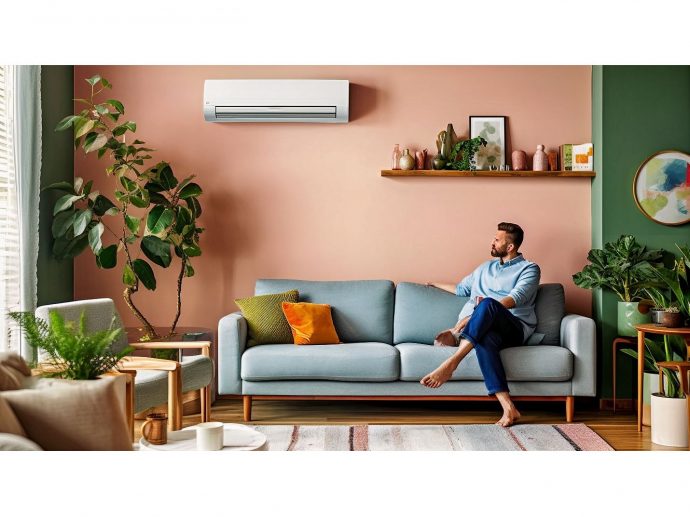Categories more
- Adventures (17)
- Arts / Collectables (15)
- Automotive (37)
- Aviation (11)
- Bath, Body, & Health (77)
- Children (6)
- Cigars / Spirits (32)
- Cuisine (16)
- Design/Architecture (22)
- Electronics (13)
- Entertainment (4)
- Event Planning (5)
- Fashion (46)
- Finance (9)
- Gifts / Misc (6)
- Home Decor (45)
- Jewelry (42)
- Pets (3)
- Philanthropy (1)
- Real Estate (16)
- Services (23)
- Sports / Golf (14)
- Vacation / Travel (59)
- Watches / Pens (14)
- Wines / Vines (24)
- Yachting / Boating (17)
When is the Right Time for a Home Air Conditioner Replacement?
Published
06/13/2023Summer months tend to consist of hot air coming from the fan, sweating all the time, losing the ability to sleep comfortably, and many more. Fortunately, air conditioners are here to help, and they can generally last for many years, especially when you take good care of them. See more ways on extending the lifespan of your system on this site here.
However, if you frequently find yourself dealing with breakdowns and calling the techs for repair, it might be the best time to replace your unit and shop for a more energy-efficient one. So, when do you take the plunge?
Replacing your Older HVAC
The average lifespans of many air conditioners tend to be 10 to 15 years, and this includes proper maintenance and routine cleaning of the ducts and filters. Deciding whether it’s time to buy a new one will depend on whether you notice the sky-high charges of your current heating and cooling system and if it does a poor job or makes you comfortable in the afternoon heat.
Improper temperature adjustments, uneven cool air, and hot spots are some of the reasons why you should also call the technicians. After troubleshooting, they will advise you on the replacement of your home air conditioner and whether this is a sound idea in your current situation. Other factors that may help you determine whether it’s the right time or not include the following:
Age is More than a Decade Old
ACs that are older tend to frequently break down, and this is where you should start preparing yourself to buy a new appliance. Unlike heating systems that are kept indoors or in the basement, other components of the air conditioners are generally installed outdoors, which makes them more susceptible to damage. Getting exposed to rain, snow, debris, dirt, and other factors will only shorten their lifespan.
Most of the efficiency of a split type aircon can depend on various factors, including proper maintenance during its lifetime, if there were tune-ups, and how the experts handled the unit. Correct sizes also matter, and the humidity in your place will also have an effect on its mechanical parts. The general rule of thumb is that if your appliance is already more than 10 years old, then it’s time to look for its replacement as soon as possible.
Extensive and Costly Repairs
Minor issues like a busted capacitor, or clogged drain line can easily be fixed. What this means is that these costs are often not enough to make you go to your local appliance shop and choose a new one. However, if the estimates of the contractors for your bill repair are about 50% of the current value of the newer models in the market, it will make much more sense to free yourself from the burden of a damaged AC and just get a new one.
Work might need to be done regularly to the appliance itself even if the ducts are clean. When you’re frequently calling the pros most of the time, a replacement of your home air conditioner might be in order. They’ll do an assessment and give you advice on whether it’s time to look for options or not.
Availability and Impact of the Refrigerant
Freon is common for appliances that are over 10 years old. Its name is HCFC-22 or R22 that’s used as a primary chemical to cool the home. However, when it’s released outside the environment, it tends to contribute to the damage to the ozone layer at the South Pole. This is why they are no longer imported or produced in some countries, including Halons, CFCs, and HCFCs you can read more info at this link: https://gml.noaa.gov/hats/about/hcfc.html.
Refrigerant types are generally listed in the owner’s manual, and if you can’t find this, try calling the company that sold the system over to you. Consider switching to the R-410A refrigerant that’s often used in modern units. Not only can you prevent expensive repairs, but also protect the environment at the same time.
Overall Costs of Your Bills
ACs in tip-top shape may still result in higher energy bills regardless of how well you maintain them. The ones made in the 1990s should have a SEER rating of 10, and the system changed this to 2015, where they should meet a minimum of 14 so you won’t face a larger bill.
Smaller air conditioners that need to cool a large room or have a small amount of refrigerant will tend to work harder to maintain the temperature. Their overworked and worn parts may also have an impact on the current energy efficiency. This is why buying a new unit might be worth it after all.
Duration of your Stay Inside the Home
People often relocate because of their jobs, and others are planning to sell their homes because the real estate industry is good. Unless you’ve experienced an excess repair from a sudden breakdown, buying a new HVAC won’t be a good investment unless you’re not planning to go somewhere soon. When there are no plans of moving out, the extended warranties might be your motivation when it comes to thinking about a replacement.















